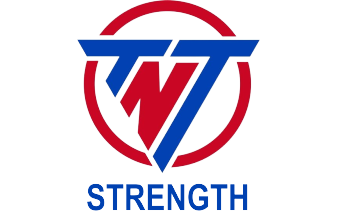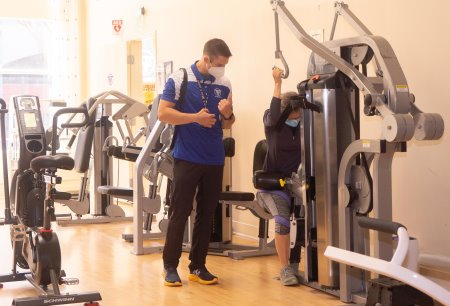
By TAKU
Strength Training Q & A: (Answers to common questions clients may ask about strength training)

Q: How will strength training change my appearance?
A: Strength training affects body composition in two ways. First, strength training increases muscle tissue by enlarging individual muscle fibers. Second, strength training decreases body fat by burning extra calories both during the exercises session and during rest. This occurs because more muscle tissue means that more energy is burned in the process of tissue maintenance and repair. The result of more muscle and less fat is a more firm, fit, and trim appearance.

Q: How much muscle will I gain?
A: Although the amount of muscle tissue gained varies among individuals, the average beginner adds 2-5 pounds of muscle after 8-10 weeks of regular strength training. Do not try to compare yourself with others, however, because everyone develops muscular strength and lean body mass (new muscle tissue) at a different rate due to inherent physiological and biomechanical factors.

Q: How much fat will I lose?
A: Your diet is the most important factor in losing weight. Over fat people who follow a balanced diet typically, lose 10-12 pounds of fat after 8 weeks of regular strength training.

Q: What should I eat?
A: This answer could be a whole article in and of itself (and it is Click Here). However, this is not a nutrition article so I will stick to the basics. Whether you are in the Paleo, Modified Mediterranean, South Beach, Vegan, Ketogenic, or Carnivore camp, what matters is that you stay away from processed foods such as foods with added sugar, industrial seed oils, and processed carbohydrates. You can’t go wrong if these are on your grocery list: eggs, chicken, fish, red meat, and if desired (and tolerated) raw, whole-fat dairy, as well as fresh fruits and vegetables. Avoid anything containing, high fructose corn syrup, white flour and industrial seed oils. If consuming any carbohydrates, attempt to emphasize whole-food, complex carbohydrates over refined grains and grain products. Always avoid simple sugars and go for grass-fed, free-range, and wild-caught proteins over highly processed high-fat proteins sources. The calories should be enough to support your current goals, which may include losing fat, gaining muscle or maintaining your current weight.

Q: Do I need extra protein, vitamins or minerals?
A: Again, this is not a nutrition article. For the most part supplements are, supplemental. They should be added and experimented with only after one has worked out all the kinks of their basic exercise and nutrition plan. Unless your doctor prescribes particular nutritional supplements, you probably do not require extra vitamins or minerals. a balanced diet of fruits, vegetables, High-Quality meats and “friendly” fat sources such as raw nuts and seeds, and cold-water fish normally provides more then enough nutrients for an exercising individual. If you have difficulty eating a balanced diet, you may benefit from a daily multi-vitamin and mineral supplement. Current research does indicate that there is a minimum effective dose for protein. I recommend you strive for one gram of protein per pound of ideal body weight as target amount for daily protein consumption.

Q: Do I need extra sleep?
A: Sleep requirements vary considerably from individual to individual. However, a person involved in regular strength training should not wake up feeling tired. Most exercising adults should obtain 7-8 hours sleep per night, and exercising children should obtain 8-9 hours sleep per night.

Q: How fast will I progress?
A: Research indicates that beginners typically increase their strength performance by about 50 percent during the first few weeks of training. Although part of this improvement is due to learning factors, adults often add 2-3 pounds of new muscle tissue during their first two months of strength training. This results in greater strength, more energy utilization and a more firm and fit appearance that should be obvious to you and others after 4-8 weeks of training.

Q: Does my age make a difference in how fast I progress?
A: Age does not reduce the training effects, but the results may come more slowly in older individuals. Regardless of your age, you can improve your muscle strength through proper strength training.

Q: Does my sex make a difference in how fast I progress?
A: Males and females respond in the same manner to sensible strength training. Although due to genetic and hormonal differences men are generally larger and stronger then women, the rate of strength gain is essentially the same.

Q: Does equipment make a difference in how fast I progress?
A: Although equipment can make a difference in strength development, how the equipment is utilized is much more important. Free weights, cable based equipment and well designed machines such as Nautilus and Medx machines are all effective when used properly. Proper muscular over load, progressive resistance, stress intensification and personal motivation are the keys to strength improvement regardless of the equipment used.

Q: Does supervision make a difference in how fast I progress?
A: Supervision can make a big difference in both the process and the product of your strength training. Most people perform much better with instructors who have a sound knowledge of strength fitness, good teaching skills, and high levels of enthusiasm. Make every effort to find a strength-coach, instructor / Personal trainer who exhibits these qualities.
TEXT “TNT” TO 855.796.9905 to feel half your age and twice as strong in 2 weeks!
TNT has over 35 years of combined fitness experience, so if you’re looking for a coach who can train you online from anywhere in the world, visit our online training page to book a consultation.
TNT wants you to maximize your strength as safely and efficiently as possible, so if you’re looking for a stand alone workout plan, check out our 6-week bespoke strength training and nutrition programs.

















